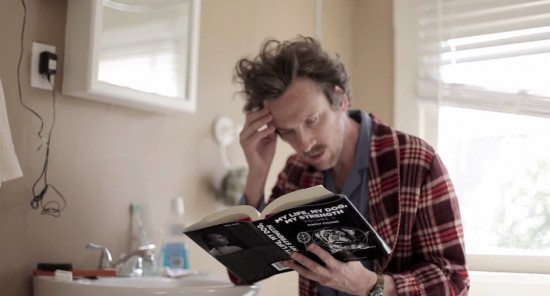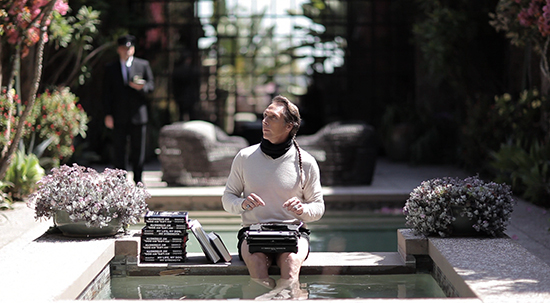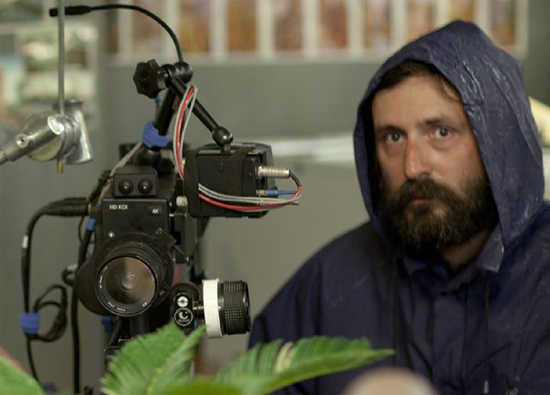Interview With 'Wrong' Director Quentin Dupieux: "Almost Every Movie Makes Too Much Sense"
There's a quality to the most recent films from Quentin Dupieux, Rubber and Wrong, that I find approachable and endearing, even comforting. Dupieux rejects standard storytelling rules and structure, but follows a perceptible internal logic that holds his tales together.
He injects stories with seemingly meaningless elements, but there is a method by which they are then incorporated into the world. The forces at play in Dupieux's films are not always positive ones, but once unleashed they are taken in stride. The strangest surprises of life — a killer car tire, a pet kidnapper, a horrible disfigurement — are not rejected. They're not things that "can't be." They're accepted, and dealt with, and life goes on.
Dupieux creates images that have a colorful, even lurid appeal. But he offers them in the same matter-of-fact manner that characters in his films exhibit. I've read many interviews with Dupieux where he evades questions of interpretation and meaning. So for our relatively short chat, I focused on process. We spoke of his aims in creating a script, his working method, and the fact that a film like Wrong would likely not exist if he had only 35mm film as a medium.
What I found, in conversation with the director, is that the spirit of his films — that matter-of-fact acceptance of the unusual — is very much present in the man himself.
 What' the first idea for a film like Wrong? Where do you start?
What' the first idea for a film like Wrong? Where do you start?
A lot of people are asking, but it's hard to remember how it started. But usually, I start with a visual idea. Like, something that feels right and something that feels strong for a movie, within my perception.
As you go along, are visual ideas the things that drive you, more than dialogue or anything else?
Yes, because dialogue... I'm a dialogue machine. I can just write like 20 pages in an hour. (laughs) I know it's a cool skill, I like it, I love to write dialogue, but I know it's not enough for a movie. So usually, yes, I trust my visual ideas. But when I say a visual idea, it can be a tire rolling, but it could also be a vibe, just this guy with a grey costume, working, under the rain. When I write a movie, this type of simple idea at some point is enough to get inspired.
Sounds like you work from a fairly intuitive beginning.
Yes, of course! That's what I'm trying to do. I'm not trying to be smart about writing. But then, also, after the first draft, usually I work a lot on the logic. It has to make sense even if it's like a nightmare, a bad dream, or whatever. Everything has to make sense. So then I'm super-focused, and I guess usually you focus on... a writer is supposed to focus on the storytelling, on the characters, and on the construction. I don't do that. I only work on the logic, almost like math.
Do you get frustrated, then, when people say Rubber or Wrong doesn't make sense?
That's the thing... almost every movie makes too much sense. That's why we call them movies — they're very different from life. And usually in a movie, at the end, you feel satisfied because everything is in order, and everything makes sense. That's why you're supposed to feel good when you watch a mainstream movie. And I have to say, I enjoy it. It's like, for 90 minutes, you watch something that is not really connected to real life.
But from my point of view real life doesn't make sense. Every day you experience stuff that is not necessarily perfectly scripted. That's what I'm trying to do, basically, I'm trying to bring some organic elements, something that is more connected to.... you know, for example, when you dream your unconscious makes connections with things that are not supposed to be connected. I really do think it's the same in real life, I think life would be super-boring if everything was scripted.
So I'm not saying I don't like the way movies work. I'm just saying that I think there's a lot of space that we can explore, instead of always working on the same structure. I think there's a lot of space for different visions and not only the perfect script. So I have to say, no, I don't get frustrated [reading that]. I mean, a movie like this, at first when I finish it, when I watch it for the first time, I really do think like "oh, this only makes sense for me." I'm not even thinking about the audience when I do this. But then, if like, ten people LOVE it, truly love it, like more than anything else, I'm super happy. I don't need more!
 Relating movies to life, people often look for patterns, or force their lives into patterns. We're used to trying to make sense out of things in a certain way. Do you reject that in your own life?
Relating movies to life, people often look for patterns, or force their lives into patterns. We're used to trying to make sense out of things in a certain way. Do you reject that in your own life?
I'm fighting against... I don't know. I think, just because I don't have a job, just because I can decide to spend a day watching a tree if I want (laughs), just because I'm what we call free, but it's not that crazy. We're not supposed to be like trained animals. Just because of this, I already feel like a weirdo, in a way. Just this makes me different to a lot of people. I can do what I want. I don't reject the normal script for life, but I'm just out of it. I decided when I was young to quit school and make movies, make music, and enjoy myself instead of working.
It's a long process, just this, when you quit school early, you're already different. I think, for a lot of people it's pretty scary to wake up every day, you have to decide what to do. A lot of people need to be in a pattern, or a structure.
As you make a film, you do much of it yourself. You're the cinematographer, you write, you edit, you direct. Is that process essential to the way that you make movies? As you're writing Wrong, are you thinking "I'm going to be in control of the camera on the day we shoot this"?
It's not quite like that, it's more like the process of writing the script myself — I can try to find someone to help me, and I can try to find a good editor to work with. But the thing is, when you do it yourself, first you just have to feel it. You don't have to communicate something to something else, to make them feel it. You just have to feel it yourself.
I'm not trying to control everything, I love to show my first cut and talk with friends, to get good advice [about it]. I'm not just trying to make my own thing. I'm not in my small world. I love to share, that's what I'm doing with actors, for example, like Jack Plotnick on this movie. He helped me a lot, trying to understand the script, trying to get the best "juice" out of it.
I just enjoy using a camera. I love when you use the camera, you are so focused on everything. It's like watching the movie, basically. You don't want to screw up, you have to make it perfect. So you're watching the movie, and you know if it's good or not, because you are super-focused. That's why I need to be operating the camera.
Same for editing. Editing is a different process. You can, of course, give everything to someone, let them work, and come back three weeks later. You watch, and then say "oh, no, not like this, and you should reverse this." It's a lot of talking. (laughter) It's a lot of.... sometimes you feel something. You know THIS is right, but it's hard to explain why. Usually, when you share the job with someone else, you do have to explain it. You have to tell an editor, "you should cut these two lines, because we don't want them, because they don't feel right." If the editor thinks "no, they're great!" then you're fucked, and you have to talk. And sometimes you can't explain why something is good or not. Editing is also a good way to make the fun longer. Like, OK, the movie's shot. Sad! But no, there's more to do!
How do you communicate that sense of feel to actors?
Basically, the script is everything. When I meet someone, like for example Bill Fichtner, he just read the script before meeting me. He read it, he loved it, he got it. We met, and I understood he read the same thing I wrote. He was not dreaming about something else. He understood the script, he got it, and so it's pretty much easy. Even with the small parts, I just sit and watch the casting sessions, and can see when someone understands what they're doing, when they're not trying to be a "good actor," when they're just into it because they get it. So finding actors, finding the good ones, it's quite easy in a way. Because it's natural, basically. I'm not saying they come to you, but you find the right one because it's a special world. If you send this script to Bruce Willis, if he says yes, you know it's for a good reason.
So it's not like you're communicating a feel on set, because you've effectively already done it during the casting process.
Yeah! And I truly think that the script is everything. If you say "yes" when you read this, you know what to expect. Otherwise, my set looks like a set. We're just dumb people shooting a script. There's nothing special about it. Like, "now we do the scene where you are in the coffin, but you're not dead." And it's "yeah, it's in the script, let's do it."
 You've shot on 35mm, before the industry made a big shift to digital. Could you make this movie shooting on film?
You've shot on 35mm, before the industry made a big shift to digital. Could you make this movie shooting on film?
No, unfortunately not. [This movie is] too quick. You need at least twice the time [to shoot on film]. It's impossible. The way we shot Wrong, with no lighting, and the way I move the camera in five minutes... I'll do one setup, five takes, then I can move the camera in five minutes to get the next shot. [He mimes flipping the camera and gear around an actor.] The actor stays here, he doesn't go to the trailer. If we need to add some make-up, that's thirty seconds.
We keep shooting all day long, and you can't really do that with a big camera. We shot this in 22 days; we'd need at least 40 days to shoot in 35mm. That's super-expensive. Suddenly it becomes something heavier, and you don't get the same juice out of the actors because they have to wait. It's suddenly a different process. Yes, my first movie was shot on 35mm, and that's why I enjoyed discovering the Canon 5D so much. You just spend your day shooting, you never wait. Every actor I work with is usually amazed and super-happy to be on the set all day long, shooting, shooting, shooting. Not waiting. I can't go back to the old method.
Movies have a hierarchical structure from a professional point of view — there's a ladder where people often start on small movies and work up to bigger ones. Is that process something you're interested in?
I'm just interested in making bigger movies, first to have more time, and also I would like to be able to pay very interesting big-name musicians [to work with me]. But for the movie itself, I'm not frustrated shooting the way I shoot. I have to say I enjoy it. The idea of working for two years on a movie, that's not for me. I can't stand it. I get bored very quickly. Yes, I would love to have more money to shoot just to have more comfort, but not to make the movies bigger.
Wrong is available on VOD now and will be in theaters tomorrow, March 29. Info on theatrical showings is available here: http://drafthousefilms.
com/film/wrong#watch
